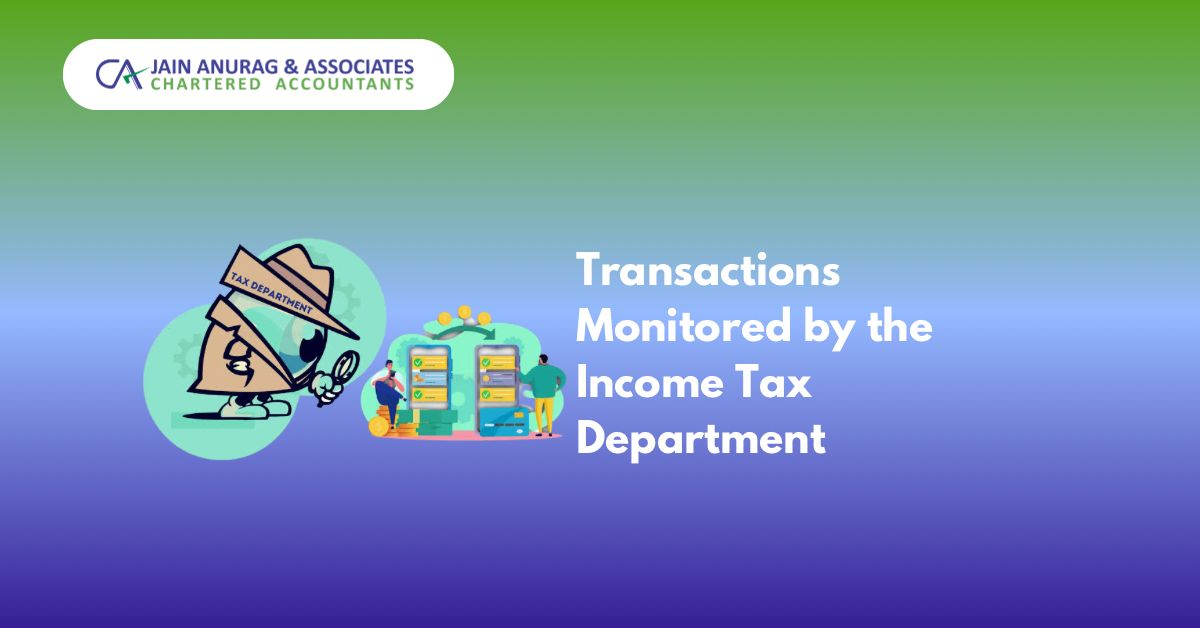Jan 18, 2025, Posted by Admin
Transactions Monitored by the Income Tax Department

In today’s digital age, the Income Tax (IT) Department has become more vigilant than ever when it comes to monitoring transactions. With advanced technology and stricter compliance norms, certain financial activities are more likely to catch their attention.
Key Cash Transactions Monitored by the Income Tax Department
When it comes to high-value cash transactions, the Income Tax Department doesn’t take things lightly. In their efforts to curb tax evasion and money laundering, tax authorities keep a close watch on a variety of cash dealings. Whether you’re buying property, investing in financial instruments, or even just making substantial bank deposits, certain transactions could trigger a red flag. Let’s discuss the details of what’s monitored and why it matters.
1. Buying Real Estate
If you’re purchasing property worth ₹30 lakh or more, be aware that the property registrar is required to notify the tax authorities. This rule, under Section 12 of the Prevention of Money Laundering Act, 2002 (PMLA), aims to prevent large, unreported cash transactions. The registrar must share key details such as:
• Names and addresses of the buyer and seller
• Transaction date
• Property type (e.g., land, apartment, house)
• Location and sale price of the property
Whether the payment is made in cash or through a cheque, any property transaction above this threshold is monitored.
2. Investing in Stocks, Mutual Funds, Debentures, and Bonds
If you’re investing ₹10 lakh in stocks, mutual funds, or bonds within a financial year, the issuing companies are obligated to report your transaction. This includes:
• Your name and address
• PAN number (if provided)
• Date and amount of the investment
• Type of security (e.g., bond, mutual fund unit)
This measure helps the Income Tax Department identify unreported income or suspicious financial activities.
3. Acquiring Foreign Currency
Planning a foreign trip or investing abroad? If your foreign currency transactions total ₹10 lakh or more in a financial year, they’ll be reported to the tax department. This includes:
• Buying foreign currency notes, traveler’s checks, or forex cards
• Using credit or debit cards for foreign currency payments
Exchange providers must report such activities, ensuring transparency and discouraging tax evasion.
4. Depositing Cash in Bank Accounts
If you deposit cash worth ₹10 lakh or more into one or multiple savings accounts in a financial year, your bank will notify the Central Board of Direct Taxes (CBDT). The details they’ll provide include:
• Your name, address, and PAN (if available)
• Account details and deposit amounts
Even smaller deposits that cumulatively cross ₹10 lakh will be reported. This rule excludes current accounts and fixed deposits.
5. Deposits in Fixed Deposits (FDs)
Banks are required to report when you deposit ₹10 lakh or more in fixed deposits or recurring deposits within a financial year. For example:
• Deposit ₹5 lakh in January
• Add ₹3 lakh in February
• Deposit another ₹2 lakh in March
The cumulative total reaches ₹10 lakh, triggering reporting requirements. Banks will share your name, address, PAN, and account details with the tax authorities.
6. Paying Credit Card Bills
If you make cash payments of ₹1 lakh or more toward your credit card bills or settle dues totaling ₹10 lakh or more in a financial year (through any payment method), the credit card issuer must report this to the Income Tax Department. The details include:
• Your name, address, and PAN
• Payment date and amount
• Payment method (cash, cheque, NEFT, etc.)
Keep this in mind if you plan on making large credit card payments.
How Does the IT Department Monitor These Transactions?
The IT Department uses tools like the Annual Information Statement (AIS) and Form 26AS to collect data from banks, financial institutions, and other reporting entities. This information is cross-checked with your tax returns to identify discrepancies.
What You Can Do to Stay Compliant
• File Accurate Returns: Always declare all your income, including interest, capital gains, or any other earnings.
• Maintain Records: Keep detailed records of your transactions to justify your claims during an audit.
• Avoid Cash Transactions: Opt for digital payments to reduce the likelihood of errors or suspicion.
• Respond to Notices: If the IT Department contacts you, respond promptly and provide accurate details.
Stay Compliant, Stay Safe
Understanding and Monitoring these regulations is essential to avoid unnecessary trouble. It isn’t about invading your privacy; it’s about ensuring fair play in the economy. By staying compliant and transparent, you can avoid unnecessary hassles and contribute to the nation’s growth.
If your transactions fall under any of these categories, ensure they are properly documented and reported. Transparency is key to staying compliant with tax laws and steering clear of legal complications.